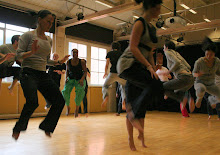1. When devising theatre, often resource can be a material resource which ideas are built from. We were introduced to Porto through a series of images that we perceived as links and transitions, such as doors and stairways. As part of the research phase, these then lead us to discussing the theme of departures, arrivals, journeys and baggage. Also in research, we engaged in an imagery exercise of certain situations based around Porto’s idea, as a starting point for our characters.
From there, we began to embark on a creative journey, constantly researching and crafting. We have begun to move into the ‘score’ phase. When scoring, material is generated through things such as creative play and adding music and so on. In Porto, music is being carefully selected to mirror what we are creating in performance. For instance, choosing a song that repeats itself and is stuck in a pattern can reflect the people onstage who may be revealing this through the body.
Dymphna Callery says “…improvisation uses play to achieve an unforeseen result…Play is a much looser concept, like a jam session.” And describes how Peter Brook “not only uses play as a starting point [but also] as a basis for personal growth and self-development for his actors…” (Callery: 2001, pp.94-96) More and more we are participating in creative play sessions, where a lot of our material is being created or refined. New ideas appear every day from simply interacting through improvisation.
2. A narrative certainly begins to show itself occasionally in Porto but then I have the thought that this will never be a set piece with a narrative. It is always changing and will always change. I do begin to notice things have remarkably started to fit together, though. Considering we have created a lot of content through creative play, small narratives have most definitely been initiated. At the same time, we all seem part of something far bigger and more intriguing. As an ensemble, we have a lot of contact with Blake and Nicola, which in my mind is ‘the bigger picture.’ In the meantime, we are all making relationships with other people. When I first enter the space at the beginning of Porto I always imagine it to be a departure lounge at an airport. We are all travelling somewhere, part of this transition or journey. We become a form of community, of which some people just do not fit for a variety of reasons. However, I do strongly feel that Porto may never have a chronological reasoned narrative, because it is based on impulse. The narrative is whatever direction Porto may take.
Daria Halprin discusses how the body “reflects our way of being as humans” and that we are an array of “emotional responses, cognitive and imaginal thinking…motivated by a compilation of life experiences…destructive and creative imprints, impulses, and desires.” (Halprin: 2003, p.17)
3. My character has in many ways remained true to the original goals and themes set out in the original letter we sent. During the research phase, I wrote about my character’s departure as being “…one of fierce determination juxtaposed with a terrible fear.” The terrible fear seemed to consume my character to start with, instead of the determination as I had intended. The intent was on looking back at what she had left behind more than looking towards the future. This did surprise me, but I went with it.
However, the more we partake in the play, my character has accidentally become more confident, and is preoccupied with the present instead of the past. This is something that has happened naturally, yet was my original intention! It has most definitely not become more tangible! I do not think my character knows what she wants emotionally, and could change her mind at any point! Physically, she has yet to expand. To take more risks is my aim, and I feel until I initiate this, my character cannot reach her full potential. “We applaud the actor for ‘taking risks’, ‘exposing herself’…’” (Auslander, in Zarrilli 1993, p.60)
Bibliography
Callery, D (2001): Through the Body: London: Routledge.
Halprin, Daria (2003): Expressive Body in Life, Art and Therapy : Working with Movement, Metaphor and Meaning. London: Jessica Kingsley Publishers.
Zarrilli, P (1993): Acting (re)considered: Theories and Practices: London: Routledge.
Posted by Gina Dobrovic
skip to main |
skip to sidebar
Welcome to Porto2009.
This is the begining of our journey on the road of Porto2009. And the blog will give us the opportunity as a group to reflect on the work in which we have done within the sessions. We will keep you posted regarding the process we are making along the way.....
Enjoy.
Enjoy.



No comments:
Post a Comment